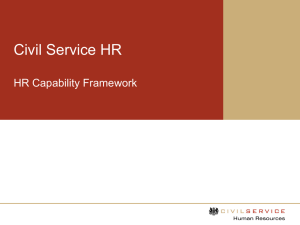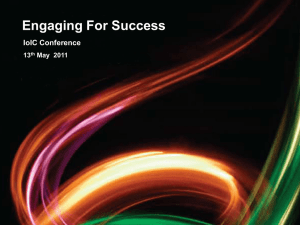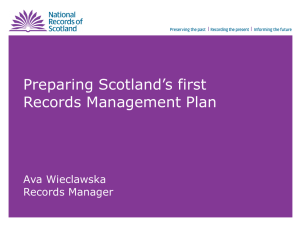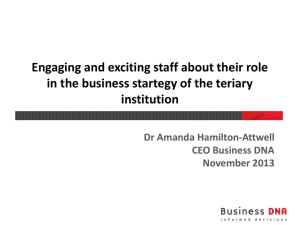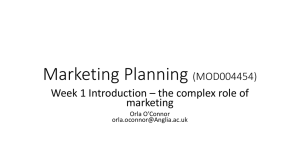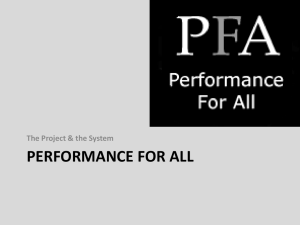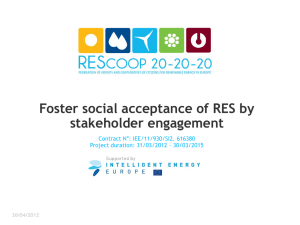HR CAPABILITY - Civil Service
advertisement
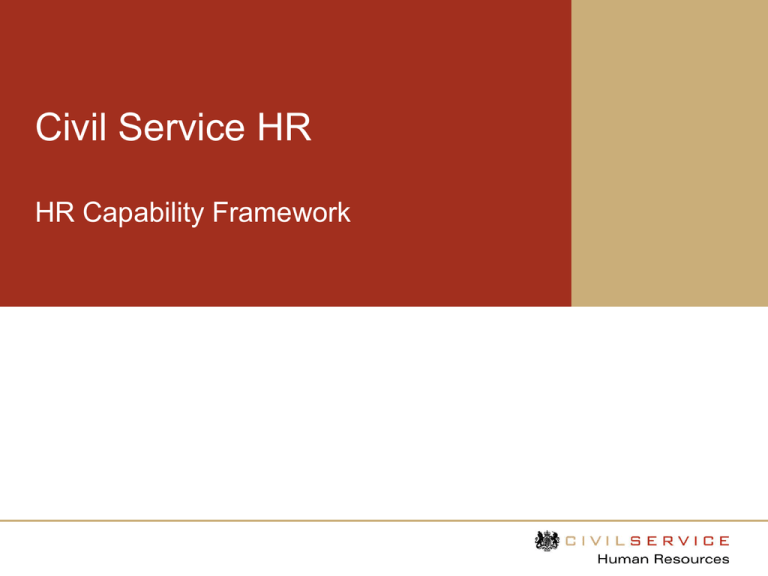
Civil Service HR HR Capability Framework Purpose of the framework • The HR capability framework sets out professional standards which Civil Service HR professionals should demonstrate. • As we move to a “One HR” model in the Civil Service, we require a single set of professional standards for everyone in HR. • The standards supplement departmental competence frameworks and replace the PSG HR standards. • The framework incorporates four levels of professional standards ranging from entry level to SCS. • Within each level there are Activities, Knowledge, Behaviours and Outcomes. Development of the standards • The standards are based on the new “HR Profession Map” which the Chartered Institute of Personnel and Development (CIPD) has developed in conjunction with HR practitioners in a range of organisations and sectors. • The CIPD Profession Map defines best practice HR competence and will form the basis of future CIPD membership accreditation. • In developing the HR capability framework, the standards from the CIPD HR Profession Map which are most relevant to the Civil Service HR Service Delivery Model were identified. • The framework therefore provides a link between the professional standards in CSHR and the wider HR profession. How will the standards be used? • The capability standards help you to identify your strengths and your development areas and agree professional development objectives. • They will form the basis of professional development interventions; CSHR professional development activity will be geared towards helping you to develop yourself to meet the standards. • They will be used in CSHR role profiles to describe some of the activities, knowledge, behaviours and outcomes which will be required in roles. • The framework will be used to supplement departmental competency frameworks it will not replace them. Identify your Capability Level Capability Level 1 Example Grades AA- EO (DWP, Home Office); A1- B3 (FCO); Band E and D (MOD) 2 3 4 HEO-SEO (DWP, Home Office); Grade 7-6 (DWP, Home Office); C4- C5 (FCO); D6-7(FCO); Band C (MOD) Band B(MOD) SCS Where time is spent Providing information, managing data, process delivery. Understanding the issues and parameters, issue analysis, evaluation, solutions and likely consequences. Understanding the functional and business realities, providing insights and linkages, flexible and innovative solutions, risk analyses. Understanding the organisational and industry realities and the client’s needs, developing strategies and plans. Service to the client Facts and information. Administration. Process support. Query Handling Issues handled. Flexible options and recommendations. Ideas, insights and challenge. Solutions. Measures Service excellence, efficiency, accuracy, flexibility and continuous improvement. Client satisfaction. 30: 70 Issues and problems satisfactorily resolved. Business credibility. Trusted partner. Seat at the leadership table. Running a commentary and challenging the strategy. Leading the business by applying HR expertise. Inspirational leader. Sought by client as development and performance coach. 50: 50 60: 40 Relative skill balance Behaviours: Technical 80: 20 Capability Level 1 Activity 1. Provides first line advice and MI to address business and people management issues. 2. Follows agreed methodology and process but is flexible to change when new ideas are agreed. 3. Actively develops understanding of the HR profession both within, and beyond the Civil Service. 4. Works with other areas of Civil Service HR to deliver objectives. 5. Seeks advice from team leader and colleagues to achieve objectives. 6. Feeds ideas, observations and suggestions for improvements when they become apparent. 7. Plans and executes personal and professional development. Knowledge 1. Knows the organisation structure, culture, values, operations and goals, its range of products and services and its customer base. 2. Knows how to deliver service excellence, handle and resolve complaints and deal with difficult customers. 3. Has the technical knowledge required to meet the objectives of the role. 4. Understands how the component parts of Civil Service HR combine together to create an overall service offering to the business. 5. Understands how to work with others in HR to prioritise tasks and manage time to reach objectives. 6. Knows the department’s/ Civil Service’s HR policies, procedures, processes and practices. Behaviours Independent: Is confident in asking questions and seeking clarification. Curious: Seeks feedback on personal performance, reflects on it and uses it to modify practice and plan development. Decisive Thinker: Uses previous experience, standards procedures and common sense to make decisions. Skilled Influencer: Identifies the key points to communicate, selecting the right channel for the message and audience. Driven to deliver: Demonstrates a consistently strong bias for action and a desire to deliver. Collaborative: Makes a positive contribution to the team, supporting and coaching colleagues through their day-to-day work. Personally credible: Takes pride in being considered trustworthy and dependable by stakeholders, colleagues and the line. Role Model: Champions personal, departmental and Civil Service values, processes and expected behaviour. Relationships: Builds relationships with colleagues in CSHR and with customers. Outcomes 1. Employees and line managers feel HR services support them in their day-to-day work. 2. Customers receive service excellence. 3. Personal and team objectives are met. 4. Organisation’s capability to manage people is improved. Capability Level 2 Activity 1. Uses information to provide analysis and insight to enable HR and Line Managers to make informed decisions. 2. Partners with and coaches managers in people and change, supporting them to drive and sustain improvements in their business. 3. Delivers business solutions by working with colleagues across Civil Service HR. 4. Identifies opportunities and makes recommendations for improvements to HR and the business. 5. Coaches and supports other HR professionals to focus their contribution on high-priority and high-value delivery. 6. Plans and executes personal and professional development. 7. Actively develops understanding of the HR profession both within and beyond the Civil Service. Knowledge 1. Knows the organisation structure, culture, values, operations and goals, its range of products and services and its customer base. 2. Understands the capability and skills requirements of the organisation to meet and exceed performance objectives. 3. Has the technical knowledge required to meet the objectives of the role. 4. Understands how to communicate with all stakeholders and deliver service excellence. 5. Understands how the component parts of Civil Service HR combine together to create an overall service offering to the business. 6. Knows how to deploy HR processes, policies, practices, tools, techniques and approaches effectively. 7. Knows how to plan, prioritise and deliver work on time and within budget. Behaviours Independent: Has the confidence to analyse, question and challenge the status quo. Asks for help when something is unclear. Curious: Seeks out feedback from HR colleagues and line managers, using learning points on to modify practice and plan development. Decisive Thinker: Applies (and adapts) own judgement and criteria to make an appropriate decision for current circumstances. Skilled Influencer: Tailors the design and tone of an interaction in order to appeal to and engage with different audiences. Driven to deliver: Maintains enthusiasm and commitment to deliver results in the face of difficulties. Collaborative: Builds a sense of team spirit, in Civil Service HR, encouraging shared ownership of objectives and deliverables. Personally credible: Consistently delivers commitments and accepts responsibility even when things go wrong. Role Model: Supports colleagues and champions personal, departmental and Civil Service values, processes and expected behaviour. Relationships: Builds networks with colleagues outside CSHR, in the wider HR profession, business and public and private sectors. Outcomes 1. Line Managers feel confident in undertaking people management responsibilities. 2. Local performance and productivity is improved. 3. Personal and team objectives exceeded. 4. Improvements to the professionalism of HR service delivery. Capability Level 3 Activity 1. Offers unique insight into the organisation borne from a deep understanding of the business and HR profession. 2. Advises and coaches leaders and managers on the implementation and efficient delivery of HR and change programmes. 3. Challenges the status quo and makes a case for change, in the business and HR, in order to improve performance and delivery. 4. Delivers business outcomes through co-ordinating the service offering of the whole Civil Service HR function. 5. Leads a team of HR professionals who fully understand how their work impacts and contributes to organisational performance. 6. Acts as a role model for continuous learning, showing an interest and curiosity in new ideas and opportunities. 7. Keeps up with business and HR news, bringing new innovations to improve people management and HR back to the Civil Service. Knowledge 1. Knows the organisation structure, culture, values, operations and goals, its range of products and services, and its customers base 2. Knows how to build organisation capability in order to exceed its performance and delivery goals. 3. Has a strong understanding of the strategy, performance goals and drivers of the organisation. 4. Has the technical knowledge required to meet the objectives of the role. 5. Can speak “the language of the business” and to translate the organisation plan into a people plan. 6. Understands how Civil Service HR integrates in order to provide an efficient, effective and professional HR practices, policies, processes, tools and techniques which have a positive impact on business performance. 7. Understands how CSHR works with other professions to create solutions which contribute to business success. Behaviours Independent: Has the confidence to have and express a point of view even if it proves unpopular. Curious: Builds a culture which encourages 2-way regular feedback as well as incorporating reflective reviews into work plans. Decisive Thinker: Analyses information and takes effective decisions. Empowering others to make decisions where appropriate. Skilled Influencer: Tailors communication and engagement with stakeholders in order to secure buy-in and commitment. Driven to deliver: Keeps moving forward, whilst encouraging others to push boundaries even when difficulties arise. Collaborative: Through sharing and transparency, builds trust, team spirit, shared ownership and common purpose in Civil Service HR. Personally credible: Takes responsibility and accountability for decisions, backing up the position with relevant technical expertise. Role Model: Leading by example- seeking and sharing knowledge, remaining composed under pressure, demonstrating the Civil Service values and championing the contribution HR can make to the organisation. Relationships: Builds networks with colleagues outside CSHR, in the business the wider HR profession and public and private sectors . Outcomes 1. Improved people management demonstrated throughout the organisation. 2. People plans have contributed to improved business results. 3. Customers are provided with a professional, credible, timely and valuable HR service. 4. Proven agility of HR service delivery which responds to business need. 5. High performing HR teams. Capability Level 4 Activity 1. Leads the organisation by shaping its direction, strategy, culture, values and goals. 2. Looks ahead, runs a commentary, and challenges executive leaders to ensure that the right organisation structure and capability are in place to deliver results in the medium and long term. 3. Leads the Civil Service wide HR function, using data to ensure it is perpetually aligned to the drivers of organisation performance. 4. Ensures all HR employees are attuned to the organisation’s goals and to how they contribute to the business’s delivery of its goals. 5. Continually scans the horizon, building a picture of Civil Service HR, set in the wider professional, political and economic context. 6. Actively promotes Civil Service HR in the wider profession and external media. Knowledge 1. Knows the organisation’s business plan, strategy, performance goals and the drivers of and barriers to organisational success. 2. Understands the culture, knows how it is created and evolves over time, and how to intervene to shape it. 3. Knows the structure of the organisation, the capability requirements and how to optimise performance. 4. Appreciates the unique context in which the Civil Service operates, the diversity of customers and how best to serve them. 5. Knows how to combine interpersonal and HR technical skills to impact the organisation, engage people and manage relationships. 6. Knows how to analyse financial and non-financial data, and use the results to develop and lead HR and the business. 7. Has a deep understanding of Civil Service wide HR strategy. With an ability to, disaggregate the strategy into specialist area plans, minimising duplication while maintaining integrated delivery to provide an efficient, effective and professional service. Behaviours Independent: Defends beliefs, even when faced with opposition from colleagues in powerful positions. Taking nothing for granted, surfacing ‘the unsaid’ and challenging inappropriate behaviour, practices and beliefs. Curious: Role models continuous improvement by seeking 360 feedback and building it into personal development plans. Decisive Thinker: Takes clear decisions in a strategic contest, with many unknowns, reviewing and refining plans on an on-going basis. Skilled Influencer: Interacts in an authoritative, engaging and compelling way, leaving a clear and memorable message. Driven to deliver: Inspires others to deliver through demonstrating energy and personal drive. Sets a personal example of consistency and determination, taking full accountability for the delivery of HR goals. Collaborative: Promotes a team ethos in Civil Service HR, removing barriers, engaging everyone, building commitment and ownership. Personally credible: Resourceful and innovative. Taking personal accountability and responsibility for actions of self and staff. Role Model: Champions, across government, deeply held personal, professional and organisational values. Remaining calm and constructive under pressure, helping others to stay motivated, positive and focused. Relationships: Builds strategic personal relationships for the good of the organisation. Outcomes 1. Improved business delivery. 2. Potential of every employee is fully realised. 3. Trusted confidante to senior colleagues with a seat at the senior leadership table. 4. Efficient, effective, agile and professional HR services. Transitioning Between Levels Level 1-2 New Priorities: Analysing short-term issues and solving operational problems with a line manager. Understanding the totality of the HR function and how to get things done in HR. Level 2-3 New Priorities: Medium and long term, increasingly complex strategic and operational problem-solving in client partnership. Working through and trusting other people. Understanding the organisation’s business as well as the HR function. Managing the performance and delivery of others and giving time to coach and support them. Visioning, explaining, engaging, involving, coaching and supporting others. Focusing on a broader team (not just individual) agenda. New Skills Focus: Awareness of HR levers and interventions that drive business value. Building interpersonal skills; including communication, listening, relationship management and influence. Broadening knowledge of the organisation and how decisions are made. Deepening technical skills and knowledge. Things to leave behind: Focus on delivering real-time service. Work which previously defined success and was enjoyed. Being personally in control. Building networks across functional, departmental and cultural boundaries. Strengthening and maintaining organisational image and personal impact. New Skills Focus: Understanding of the business levers that drive value and pose risk. Relying more on sophisticated behaviours. Shifting from talking to listening. Increasing capability to deal with uncertainty, ambiguity and intangibles. Becoming emotionally resilient and deepening self-awareness. Level 3-4 New Priorities: Long-term complex and strategic problemsolving in a trusted consultant/ adviser relationship with the client. Partnering with client to work on business, strategic and potentially invisible issues. Taking broadest frame of reference and focusing beyond existing business, market and political drivers- exploring the unknown. Leading and integrating the HR function in the context of the whole organisation. Taking a visible position, respected by senior business leaders and external counterparts. Delivering and innovating often in ambiguous circumstances with little guidance. New Skills Focus: Deepening understanding of the business and political context and of the levers and risks that threaten and drive value. Mastering partnering, consulting, influencing, engaging and communication skills. Drawing on technical expertise of others. Things to leave behind: Reliance on personal HR technical knowledge. Role modelling objectivity, integrity and courage to challenge and confront. Need to have adequate, quality information or time before making a decision. Things to leave behind: Most hands-on/ technical work.
